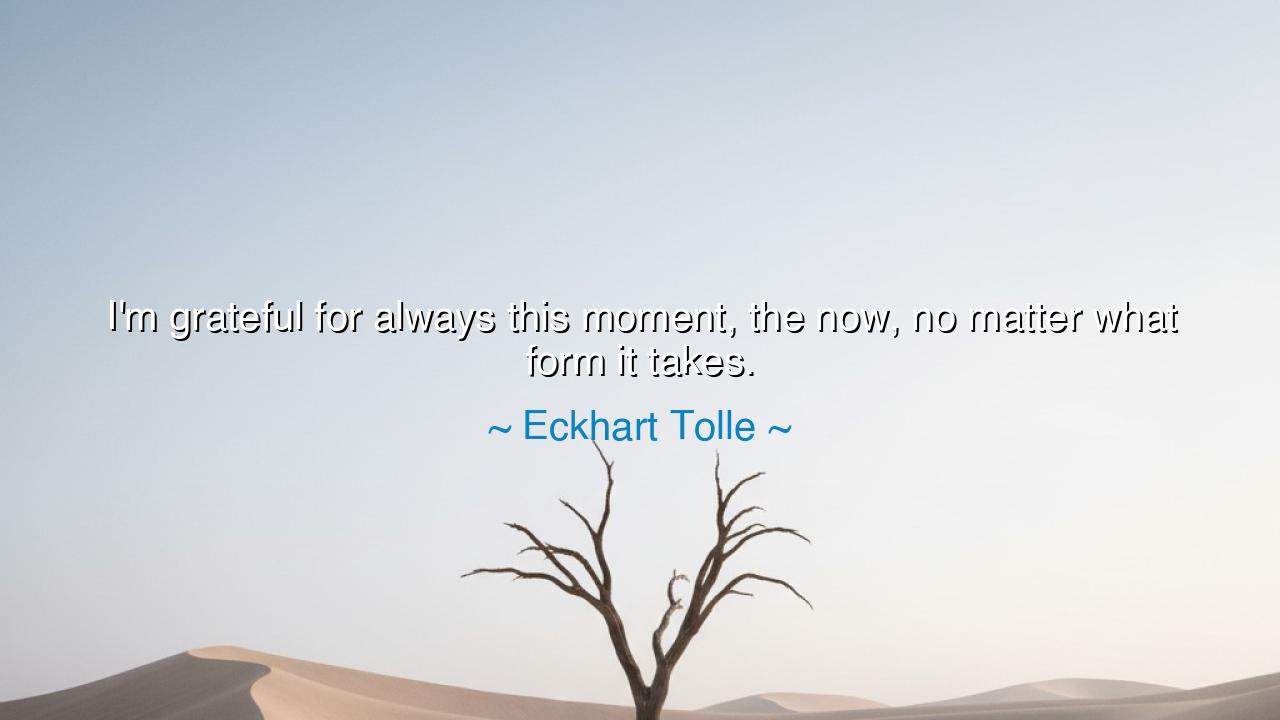
I'm grateful for always this moment, the now, no matter what






Hear, O seeker of truth, the voice of Eckhart Tolle, who proclaims: “I’m grateful for always this moment, the now, no matter what form it takes.” These words, like water flowing from a hidden spring, nourish the parched soul that forever wanders between memories of the past and anxieties of the future. The moment, the now, is the only ground upon which we stand; all else is shadow and dream. Yet men squander this gift, forever longing for what has gone or fearing what has not yet come. Tolle’s teaching is ancient as the stars, yet spoken anew: to embrace the present, to give thanks for it in all its forms, is to discover life itself.
The wise of old knew this truth well. The Stoics of Rome, such as Marcus Aurelius, urged men to dwell not on what may happen tomorrow, but to meet each instant as though it were their destiny. The Buddhists, too, taught that clinging to what has passed or desiring what has not arrived is the root of sorrow. The now is the eternal flame—uncaptured, untamed, yet always burning. To be grateful for it, regardless of whether it comes cloaked in joy or sorrow, is to align oneself with the rhythm of the universe. For the moment is the vessel through which the eternal speaks.
Yet how often do we resist this truth? A man, sitting in his chamber, laments that his life is empty because he compares his present state to some imagined glory of yesterday or tomorrow. He says, “When fortune smiles, then I shall be at peace.” But fortune never smiles enough for him. The wine is always too little, the harvest never abundant enough. Thus his life, though filled with countless breaths, is but one long sigh of dissatisfaction. In clinging to what is not, he fails to live in what is.
Consider, then, the story of Viktor Frankl, the survivor of the death camps of the last century. Surrounded by hunger, cruelty, and the constant shadow of death, he found within himself a radiant truth: even when stripped of all outward freedom, man retains one final liberty—the power to choose his response to the present moment. In the bleak barracks, when others despaired, he turned inward, finding meaning in the now itself, even in its most terrible form. He discovered that gratitude could still be kindled: in a memory, in a fleeting kindness, even in a shard of sunlight piercing the fence. Through such gratitude, he survived, and in surviving, he taught millions that the present, however cruel, is still the doorway to meaning.
Mark well this teaching: the moment is not always adorned with beauty. At times, it comes as sorrow, as trial, as loss. Yet even then, it bears hidden gifts—strength, patience, compassion. If we can bow to it with gratitude, rather than rebel with bitterness, we shall find within the thorn of suffering the seed of wisdom. The now is not to be bargained with, nor escaped; it is to be embraced.
The lesson, then, is as clear as the rising sun: Do not wait for life to become what you desire; life is already here, in this instant. To live in the past is to dwell among ghosts; to live in the future is to chase mirages. Only the now is flesh and blood, only the now is holy. Therefore, give thanks—not only when it pleases you, but even when it challenges you. For in truth, the moment is always a teacher.
What actions, then, shall the wise take? Each morning, before the burdens of the day press upon you, pause and breathe, saying: “I am here. I am grateful for this.” In hardship, resist the impulse to curse your lot, and instead ask: “What gift hides in this present form?” In joy, savor it fully, as though drinking nectar drop by drop, without haste. And each night, before sleep claims you, recall three moments from the day for which you give thanks—thus training the soul to treasure the present.
So, children of time, let this teaching sink deep: be grateful for always this moment, the now, no matter what form it takes. For when the final hour comes, it will not be the past nor the future that walks with you into the great silence—it will be the now. And if you have learned to love it, then you will depart this world not with fear, but with peace, as one who has truly lived.






AAdministratorAdministrator
Welcome, honored guests. Please leave a comment, we will respond soon